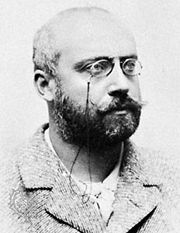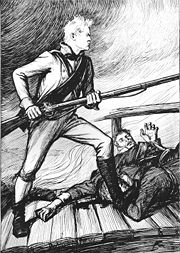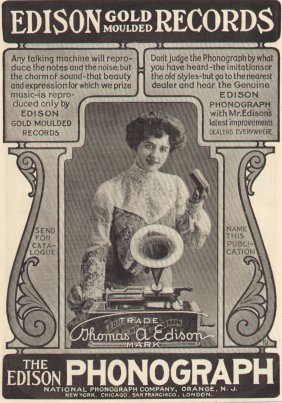
Charles G. Widdén
Encyclopedia
Swedish-American entertainer
Charles G. Widdén was a Swedish immigrant performer in the first quarter of the 20th Century. As a young child Widdén came with his family to Worcester, Massachusetts. He is said to have been from the Swedish province of NärkeNärke
' is a Swedish traditional province, or landskap, situated in Svealand in south central Sweden. It is bordered by Västmanland to the north, Södermanland to the east, Östergötland to the southeast, Västergötland to the southwest, and Värmland to the northwest...
. During the 1910s he became a very successful bondkomiker (rustic comic).
Bondkomik (rustic humor) was a popular form of entertainment in Sweden in the early 1900s. It also had a large following among Swedish-Americans. The rustic comic, often clad as a country bumpkin, assumed an alias to go along with his outlandish appearance. Widdén, for instance, sometimes went by the name of “Olle ve Kvarna” (Olle at the Mill). Hjalmar Peterson
Hjalmar Peterson
-Swedish-American entertainer:Olle i Skratthult was the stage name of Hjalmar Peterson, a Swedish-American vaudeville artist, who achieved great popularity during the 1910s and 1920s. Peterson was born February 7, 1886 in the Swedish province of Värmland. Arriving in the United States in 1906, he...
was another Swedish-born bondkomiker, who was active at the same time and had a similar repertoire. Peterson was better known by his stage name of Olle i Skratthult (Olle from Laughtersville).
Eventually Widdén moved to Brooklyn's large Swedish-Norwegian colony and became quite well known within the IOGT (International Order of Good Templars). He toured primarily on the East Coast. Proximity to record companies in New York turned him into one of Swedish-America's leading recording artists. There is only one photograph of the man, and little is known about his personal life.
Popular recording artist
Between 1913 and 1924 Charles G. Widdén recorded over 100 tracks for the ColumbiaColumbia Records
Columbia Records is an American record label, owned by Japan's Sony Music Entertainment, operating under the Columbia Music Group with Aware Records. It was founded in 1888, evolving from an earlier enterprise, the American Graphophone Company — successor to the Volta Graphophone Company...
, Edison
Edison Records
Edison Records was one of the earliest record labels which pioneered recorded sound and was an important player in the early recording industry.- Early phonographs before commercial mass produced records :...
and Victor
Victor Talking Machine Company
The Victor Talking Machine Company was an American corporation, the leading American producer of phonographs and phonograph records and one of the leading phonograph companies in the world at the time. It was headquartered in Camden, New Jersey....
labels. His output was steady. His new releases came out every single year in this period. Widdén’s repertoire consisted of songs, poems, stories and monologues. Other than a few monologues in English he did everything in his native Swedish.
The poetry included several works by the Swedish author Gustaf Fröding
Gustaf Fröding
Gustaf Fröding was a Swedish poet and writer, born in Alster outside Karlstad in Värmland. The family moved to Kristinehamn in the year 1867. He later studied at Uppsala University and worked as a journalist in Karlstad....
, whose lyrics and stories — popular on both sides of the Atlantic — were a staple of rustic humor. Widdén recorded two of Fröding’s poems about the supernatural: Bergslagstroll (Mountain Trolls) and Skögsrån (The Wood Sprite). J. L. Runeberg's
Johan Ludvig Runeberg
Johan Ludvig Runeberg was a Finnish poet, and is the national poet of Finland. He wrote in the Swedish language....
poems of patriotic Finns were also represented: Soldatgossen (The Soldier Boy) and Sven Duva (a hero of the 1808-1809 war against Russia). These verses were part of Runeberg’s epic work "The Tales of Ensign Stål
The Tales of Ensign Stål
The Tales of Ensign Stål is an epic poem written in Swedish by the Finland-Swedish author Johan Ludvig Runeberg, the national poet of Finland...
".
About one third of Widdén’s output was spoken word material, and much of his popularity rested on his original comic monologues. Today he is mainly remembered for the yodel-like laugh with which he punctuated these homespun tales. When speaking Swedish he sometimes assumed the comic persona of “Olle ve Kvarna” (Olle at the Mill). In English he became "Peterson". His 1917 story “Peterson At The Turkish Bath” was one of the first Scandinavian dialect recordings.
Charles G. Widdén had a wide-ranging musical repertoire. He recorded over sixty songs — drawing on everything from folk music and vaudeville to musical revues and dance tunes. Most notably Widdén recorded Kostervalsen (The Waltz on Koster Isle) and fifteen other numbers by Göran Svenning and David Hellström
Göran Svenning and David Hellström
Lyricist Göran Svenning and composer David Hellström were a top Swedish songwriting team of the early 20th century. Together they wrote over thirty waltzes, including the classic Kostervalsen ....
. He also covered songs by Lars Bondeson
Lars Bondeson
Lars Bondeson was the stage name of Carl Jansson-Öhlin, who was one of the founders of Swedish bondkomik . Born in Örebro in 1865, he was a singer, storyteller, lyricist and publisher. His songbooks were a major influence on countless entertainers in Sweden and America.Lars Bondeson called himself...
, Axel Engdahl, Adolf Englund, Gustaf Fröding
Gustaf Fröding
Gustaf Fröding was a Swedish poet and writer, born in Alster outside Karlstad in Värmland. The family moved to Kristinehamn in the year 1867. He later studied at Uppsala University and worked as a journalist in Karlstad....
, Skånska Lasse
Theodor Larsson
Theodor Larsson was born June 8, 1880 in Gylle parish near the town of Trelleborg in Skåne. He died June 30, 1937 in Mjölby. A Swedish bondkomiker and lyricist, his professional name was Skånska Lasse...
, Emil Norlander
Emil Norlander
Emil Norlander was a Swedish journalist, author and producer. Originally a dentist, by the late 1890s he was working as a columnist on a Stockholm newspaper. He also contributed to the humor magazine Nya Nisse, eventually becoming its chief editor...
, Theodor Pinet and Ernst Rolf
Ernst Rolf
Ernst Rolf, real name Ernst Ragnar Johansson, , was a Swedish revue actor and singer. In the 1920s he was famous for producing revues that were acclaimed for their dazzling sets, first class actors and stirring music. He was also a lyricist and composer...
.
Widdén’s comic songs often dealt with marital problems. Swedish songs such as Jäntblig (Girls’ Glances) and Stackars Olson (Poor Old Olson) were joined by American songs in translation: “Lucky Jim” as Lycklige Jim and “Don’t Take Me Home” as Mister Johnsons Klagan (Mister Johnson's Lament). Regardless of the source, they were cautionary tales of henpecked husbands. Våran Bal (Our Ball) was a Swedish version of the Irving Berlin
Irving Berlin
Irving Berlin was an American composer and lyricist of Jewish heritage, widely considered one of the greatest songwriters in American history.His first hit song, "Alexander's Ragtime Band", became world famous...
hit “Everybody’s Doin’ It Now”. Although not inherently racist, the Berlin composition was considered a Coon song
Coon song
Coon songs were a genre of music popular in the United States and around the English-speaking world from 1880 to 1920, that presented a racist and stereotyped image of blacks.-Rise and fall from popularity:...
because of the affected manner in which it was sung by White artists.
In 1924 Charles G. Widdén made his final recording. He left behind an enormous catalog of music and humor but little else. Over eighty years later his records are still sold in vintage music stores and on the Internet. And in this way the man and his legacy live on.
Renewed interest in Charles G. Widdén
In the 1970s Charles G. Widdén was rediscovered in his native country and in the United States.The Swedish Emigrant Institute of Växsjö, Sweden
Swedish Emigrant Institute
Swedish Emigrant Institute is a research center and museum which is designed to preserve records and memorabilia relating to Swedish-American migration.-Background:...
gave prominent mention to Olle i Skratthult (Hjalmar Peterson
Hjalmar Peterson
-Swedish-American entertainer:Olle i Skratthult was the stage name of Hjalmar Peterson, a Swedish-American vaudeville artist, who achieved great popularity during the 1910s and 1920s. Peterson was born February 7, 1886 in the Swedish province of Värmland. Arriving in the United States in 1906, he...
) and Charles G. Widdén in a 1973 exhibit on entertainment in Swedish America. A small disc was produced for the occasion with excerpts from their songs and stories.
The Snoose Boulevard Festival was held in the Cedar-Riverside neighborhood of Minneapolis from 1972 through 1977. In the late 19th century Cedar Avenue became known as “Snoose Boulevard”, a nickname often given to the main street in Scandinavian communities. The term derived from the residents’ fondness for snus (snuff), an inexpensive form of tobacco. The event, which celebrated the area’s Scandinavian past, featured the music, food, and arts of the immigrants who had once lived there. The headline performer was the Swedish-born singer Anne-Charlotte Harvey. In conjunction with the festival she recorded three albums of folk tunes, emigrant ballads, hymns, waltzes and comic songs. The non-profit Olle i Skratthult Project sponsored the annual celebration and the recordings. Harvey’s albums, produced by the renowned ethnomusicologist Maury Bernstein, included six songs from Widdén’s discography.
The Swedish singers Gustav Fonandern and Lydia Hedberg toured the United States and made recordings for Columbia
Columbia Records
Columbia Records is an American record label, owned by Japan's Sony Music Entertainment, operating under the Columbia Music Group with Aware Records. It was founded in 1888, evolving from an earlier enterprise, the American Graphophone Company — successor to the Volta Graphophone Company...
and Victor Records during the 1920s. Three of their songs — ones that Widdén had also recorded — were released by the Centre for Swedish Folk Music and Jazz Research on the 1981 LP "From Sweden To America". The album was issued as a CD in 1996 and in 2011 became available at iTunes
ITunes
iTunes is a media player computer program, used for playing, downloading, and organizing digital music and video files on desktop computers. It can also manage contents on iPod, iPhone, iPod Touch and iPad....
and Amazon mp3
Amazon.com
Amazon.com, Inc. is a multinational electronic commerce company headquartered in Seattle, Washington, United States. It is the world's largest online retailer. Amazon has separate websites for the following countries: United States, Canada, United Kingdom, Germany, France, Italy, Spain, Japan, and...
. Recorded in Sweden and the United States between 1917 and 1980, the collection had numbers by Olle i Skratthult, Olga Lindgren, Ragnar Hasselgren and Anne-Charlotte Harvey as well.
“Mountain Trolls” (1914 recording)


- "Well, you may believe me or may not believe me;
- But 'twas this way it was, and the devil may have me
- If 'twasn't a troll-pack that caught me one night.
- We had charge of a furnace in Westerly Moor,
- And the night was nigh finished, the clock stood at four,
- When the racket began and Pär jumped up in fright.
- It crashed round the peaks and it roared in the valley
- Like a bellowing ox in the mountains," said Olle.
- "They tramped and they stamped from all points of the compass,
- And 'twas funny, but God! it was trolls made the rumpus.
- There were some big as churches, and slowly they filed
- Through the trees, which resounded with thunder and thud;
- There was twisting and groaning all over the wood,
- For the firs were to them but as grass to a child.
- And Pär he crouched under the root of a tree
- And I by a big pile of charcoal," said he.
- "Like the clashing of iron the noise of them rang,
- For they'd arms like steam-hammers, had some of the gang;
- And some they had fists like a great iron casting;
- Some had mouths like a mine-shaft, and added to that,
- Some had thatch like the roof of a shed for a hat;
- And some sent out fire like a furnace a-blasting;
- Some had snouts like an iron steam crane in their head,
- — And golly! it was a bit scary," he said.
- "They sat round the furnace and roasted huge steaks
- Of pig-iron, and made themselves broth out of spikes,
- And ate ploughs as if chewing on chicken or lamb;
- Then all round the furnace the trolls began dancing
- Till they looked just like houses and churches a-prancing,
- And it sounded like thunder, the rumble and slam.
- I've traveled a bit and seen many a spree,
- But I never saw dance up to that one," said he.
- "And as I lay there like a bundle of clouts,
- Came a troll up with one of the ugliest snouts
- And felt me and turned my poor body around.
- 'Look sharp here, look out if you don't smell a rat!
- Here's a bit of old meat,' said the troll; but with that
- Of a sudden the sun had come up with a bound.
- 'The sun's here,' says I, 'and the east is all red.'
- They sneezed and all took to their heels then," he said.
- "It roared in the mountains and rang in the valley,
- But at last 'mid far summits, it died away slowly,
- Till it sank to a hum in the woods to the north.
- Still it looked like a fight to see chimneys a-shaking,
- When ore-house and coal-house and smithy were quaking,
- For as if turning cartwheels, they swayed back and forth.
- — Yes, trolls fear the sun just as I should fear truly
- To lie or to draw the long bow," finished Olle.
- Gustaf Fröding New Poems 1894
- English translation by Charles Wharton Stork 1916
"Peterson’s Brother-In-Law” excerpt (1917 recording)
My brother-in-law Peterson is the funniest fellow you ever saw in all your life. One night last week he went out to dinner with a friend of his by the name of Carlson, and both of them ordered steak. So the waitress served the two steaks on one big platter, and my brother-in-law Peterson was kind of hungry, I guess. Because he made a grab for one of the pieces of steak, and it happened to be the biggest steak that he got a hold of. So Carlson he didn’t like that very much, so he said to Peterson, “Say, Peterson, you is not very polite in your table manners. Now if I had taken one of those pieces of steak first I would have taken one of the smaller pieces instead of the bigger.” “Well”, said Peterson, “you got the small piece of steak. What are you kicking about?!” (laughs)External links

- Gustav Fonandern at Swedish folk parks.
- Lydia Hedberg at Swedish folk parks.
- Calle Lindström at Swedish folk parks.
- Theodor Pinet at Swedish ragtime.
Swedish music and film
Snoose Boulevard articles
Snoose Boulevard photos at the Minnesota Historical Society
The Encyclopedic Discography of Victor Recordings
Recordings at the Internet Archive
- Charles G. Widdén songs. Audio files and more. 46 tracks by Widdén and 53 by other artists. UPDATED 11/12.
- Charles G. Widdén spoken word. Audio files and more. 23 tracks by Widdén and 20 by other artists. UPDATED 11/14.
- Snoose Boulevard artists.
Streaming audio at the National Jukebox
PDF files at the Internet Archive
- Widdén poets and songwriters.
- Charles G. Widdén songbook.
- Svenning and Hellström songbook.
- Emil Norlander songbook.
Sheet music
- "Don't Take Me Home" at Indiana UniversityIndiana UniversityIndiana University is a multi-campus public university system in the state of Indiana, United States. Indiana University has a combined student body of more than 100,000 students, including approximately 42,000 students enrolled at the Indiana University Bloomington campus and approximately 37,000...
. - "Everybody's Doin' It Now" at Johns Hopkins UniversityJohns Hopkins UniversityThe Johns Hopkins University, commonly referred to as Johns Hopkins, JHU, or simply Hopkins, is a private research university based in Baltimore, Maryland, United States...
. - "Lucky Jim" at Johns Hopkins UniversityJohns Hopkins UniversityThe Johns Hopkins University, commonly referred to as Johns Hopkins, JHU, or simply Hopkins, is a private research university based in Baltimore, Maryland, United States...
.
Swedish lyrics
- Beväringsvals
- Den gula paviljongen
- Fiskarvals från Bohuslän
- Jazzgossen
- Kostervalsen
- Nikolina
- Pansarbåtsvisan
- Spiskroksvalsen
- Vi gå över daggstänkta berg
Swedish lyrics and prose: Fröding
- Bergslagstroll
- Dumt fôlk
- Farväll
- Gå på dompen
- I bönhuset
- Jäntanes frierfal
- Jäntblig
- Skogsrån
- Stôlliheta i vala
- Svampinjoner
- Tre trallande jäntor
- Ä du mä på dä?
Swedish lyrics: Runeberg
- Sven Duva
- Soldatgossen
English lyrics
- Gustaf Fröding at the Internet ArchiveInternet ArchiveThe Internet Archive is a non-profit digital library with the stated mission of "universal access to all knowledge". It offers permanent storage and access to collections of digitized materials, including websites, music, moving images, and nearly 3 million public domain books. The Internet Archive...
.
- Bergslagstroll - Mountain Trolls
- I Bönhuset - The Prayer-Meeting
- Jäntblig - Maidens' Glances
- Skogsrån - The Wood Sprite
- Tre Trallande Jäntor - Three Carolling Girls
- J. L. Runeberg at the Internet ArchiveInternet ArchiveThe Internet Archive is a non-profit digital library with the stated mission of "universal access to all knowledge". It offers permanent storage and access to collections of digitized materials, including websites, music, moving images, and nearly 3 million public domain books. The Internet Archive...
.
- J. L. Runeberg at the Internet Archive
- Sven Duva p. 56
- Soldatgossen - The Soldier Boy p.78

